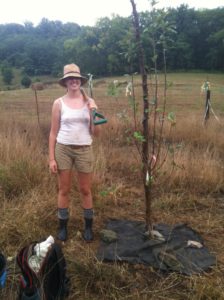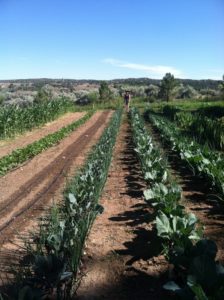Learning and Traveling by “WWOOFing”
Road trip meets agricultural education
I had the privilege, after college, to spend a few months doing what many have colloquially called “wwoofing.” WWOOF stands for World Wide Opportunities on Organic Farms, or in some countries, Willing Workers on Organic Farms, and originally, Working Weekends on Organic Farms. The organization began with a small group in England in 1971, but now has over 50 groups around the world. It is an online database that links volunteers with organic farms and growers.
Is “WWOOFing” for you?
WWOOFing is for avid travelers, farmers, curious future-farmers, food enthusiasts, or just eager, free-spirited workers. It is not so much a website for finding an internship, apprenticeship, or mentorship. Explore the world of WWOOFing. For a more serious or thoroughly educational experience, I recommend the database provided by the National Sustainable Agriculture Information Service, or a site associated with your state of residence. NOFA (Northeast Organic Farmers Association) provides this service for states in the Northeast, along with lots of other important information for beginning farmers.
The experiences I had working on farms and the communities I discovered through the WWOOF database were like a one big (satisfyingly productive) vacation. While international wwoofing is quite popular, my friend and I had an excellent time getting to see other regions of our own country, making connections with other like-minded people. I think the success we had can be attributed to the research and communication we did ahead of time. We specifically chose locations where, based on the owner’s description as well as site reviews of previous visitors, we could really learn something and not simply be used to solve labor shortage problems on the farm. Another qualifier was that we only wanted to stay in any one place for about a week. Many sites required that volunteers stay longer than that. Stays lasting for up to a month would allow for more long-term productivity from the volunteer, but there were enough places that had plenty of volunteers during the summer months, and did not mind our shorter stay.
The types of places we visited were less like traditional farm businesses and more like diverse homestead farms with associated small business projects such as farm stands. Each establishment and the people that lived there were unique, as will be the experience of every “wwoofer”.
Besides a little camping, my friend and I made our first stop in Woodbury, Tennessee at Yellow Bird Sanctuary, owned by David Wood, a philosophy professor at Vanderbilt University. He lives about an hour from Nashville, and works mainly from home, allowing him to concentrate much of his time on his 175 acres of “sculpture park, wildlife refuge, and retreat.” Of all our hosts, Wood, who required a reference to work on his farm, was probably the most thorough about communication before our arrival, which was reassuring for us as travelers and Wood as supervisor.
When Wood bought the property, he inherited with it a semi-feral goat herd, a family of Great Pyrenees that seemed to take great pride in protecting the herd, a few barn cats, and a barn that he was working on converting into an art space. Throughout these many acres of pasture we discovered a silver bullet trailer, a mostly-finished Japanese-style cob sauna, a mostly-finished cabin intended for artists in residence, and a heliotrope constructed on one of the lakes. A half mile downhill rested Wood’s beautiful home.
Though some of the labor we did at Yellow Bird Sanctuary was hard work, such as planting trees in dry, hard to dig soil, we mostly fell into a professor-student paradigm with David, and he let us work on art projects and bake bread after watering and weeding his garden.
After meandering through Arkansas and Texas, we spent a week at our next wwoofing stop, The New Buffalo Center outside Taos, New Mexico located on the site of the original New Buffalo Commune, which had an unfortunate downfall in the 1970s. Since then the house and little bit of land that went with it was bought and restored by a man named Bob Fies, and rejuvenated as a “sustainable living center.” We helped tend a small but productive hardy vegetable garden and ran a market once a week, along with a few other vendors, down the road. We spent a few hours each day weeding, harvesting, feeding chickens, and repairing fences, but there was plenty of time left over for floating down the Rio Grande, wandering around the mesa, sharing meals with other travelers, and taking siestas inside the main pueblo house during the heat of the day.
My third wwoofing experience, unlike the others, was unplanned. We made it to San Francisco and had a harder time than expected finding a willing host or cheap hostel. I browsed the wwoofing sites in the area, and spontaneously called Preston Raisin, the owner of Sonoma-Broadway Farms, which was about as close as we could get to spending the week in San Francisco. He was surprisingly receptive to my call, and requested that I forward my resume. We set up camp the next day on his property in suburban Sonoma, where his site manager worked on refurbishing the infrastructure and maintaining a field of organic tomatoes for U-pick.
Like most of the farmers I’ve met, Preston takes a unique approach to farm management. He is not a farmer by trade, but has a background on Wall Street. I was confused at first by his involvement in starting a small organic farm, but the situation made a lot more sense once I saw him bring his children there on weekends to work, play, and interact with visitors. He allowed us to camp on his land and have full access to the kitchen in the house, in exchange for a few hours of tomato-pruning and watering per day. Preston was extremely hospitable, and there was plenty of time left over to enjoy wine country and visit San Francisco.

Tree planting in Woodbury, TN. Photo by Lauren Hamilton
Our final wwoofing stop was in Sunny Valley, Oregon. The Gypsy Café is one of several “womyn’s lands” in the area. A bit far from the coast, this valley is very hot and dry during August, which made it a great time to help with the construction of a cob house, which is made out of clay, sand, and other fire-resitant materials, on the property. I spent most mornings helping to make cob, and afternoons picking wild blackberries for preserving. Some evenings the women of The Gypsy Café hosted group work sessions and vermicomposting tutorials in their permaculture-inspired garden. We contributed $3/day to have full access to the food in the kitchen and home brews were always available (with a contribution jar to fund future brewing).
Besides being an working homestead and community hostel for traveling women, The Gypsy Café is also home to a publishing group that puts out the We’moon astrological date books, calendars, and cards, which I’ve since spotted in food co-ops and health stores around the country. The place attracts some very interesting and dynamic womyn, to say the least.
I recommend wwoofing for other young travelers and budding farmers like myself who want a survey of American sustainable and intentional living. I would also recommend the program for farmers here in the Northeast, as a way to travel-in-place by hosting people from around the world. As long as you can enjoy being a host and set ground rules and expectations beforehand, both sides can have an educational and heart-warming experience.
Additionally, I would recommend the wwoofing website as a tool for farmers themselves to take vacations (if ever possible). I’ve found that farmers often have a hard time taking time off to relax, and I think many would thrive in a situation where they feel useful to another farm and can engage in an educational back-and-forth with another farmer, while getting to visit a new place. The diversity of landscapes and homesteads that we have available to learn from in America is surely overwhelming, and wwoofing makes our desires to learn and experience a little more approachable.



Nice article liz. I’ll forward it to my parents.